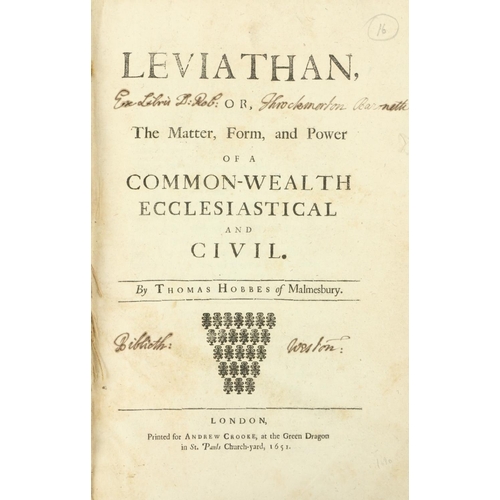HOBBES, Thomas (1588-1679). Leviathan, or The Matter, Forme, & Power of a Common-Wealth Ecclesiasticall and Civill . London: printed for Andrew Crooke, 1651 Chancery 2 o (283 x 185 mm). Collation: etched frontispiece, A 4 (title, author's dedication to Francis Godolphin, table of contents, errata, introduction); B-E 4 F 4(3+ fold-out sheet Table of Subjects of Knowledge ) G-Z 4 Aa-Bb 4 (Part 1 Of Man , Part 2 Of Common-Wealth ); Cc-Tt 4 (Part 3 Of a Christian Common-Wealth ); Uu-Zz 4 Aaa-Ccc 4 (Part 4 Of the Kingdome of Darknesse ); Ddd 4 ( A Review and Conclusion ). Woodcut head-ornament vignette on title. (Some light staining.) Contemporary English dark calf (rebacked, original gilt spine-strip laid down, corners worn). FIRST EDITION OF THE MOST IMPORTANT 17TH-CENTURY ENGLISH WORK OF POLITICAL PHILOSOPHY. Hobbes regarded the state "as a great artificial monster made up of individual men, with an existence which could be traced from its generation through human reason under pressure of human needs to its destruction through civil strife proceeding from human passions. The individual (except to save his own life) should always submit to the State, because any government is better than the anarchy of the natural state" (PMM). Hobbes' gloomy theory of the human condition caused a storm in England and brought him much controversy, but his influence, first on Spinoza, then on Bentham and other political thinkers, has lasted into our own century. The significance of Leviathan has been no less valid for subsequent economic theory. The frontispiece shows the giant composite figure of Leviathan rising above a townscape and surrounding hills, smaller scenes include a battle, an ecclesiastical court, a castle, a church, and other sacred and secular emblems; the etching is very much in the style of W. Hollar. Macdonald-Hargreaves 42; Pforzheimer 491; PMM 138; Wing H-2246; Norman 1082
HOBBES, Thomas (1588-1679). Leviathan, or The Matter, Forme, & Power of a Common-Wealth Ecclesiasticall and Civill . London: printed for Andrew Crooke, 1651 Chancery 2 o (283 x 185 mm). Collation: etched frontispiece, A 4 (title, author's dedication to Francis Godolphin, table of contents, errata, introduction); B-E 4 F 4(3+ fold-out sheet Table of Subjects of Knowledge ) G-Z 4 Aa-Bb 4 (Part 1 Of Man , Part 2 Of Common-Wealth ); Cc-Tt 4 (Part 3 Of a Christian Common-Wealth ); Uu-Zz 4 Aaa-Ccc 4 (Part 4 Of the Kingdome of Darknesse ); Ddd 4 ( A Review and Conclusion ). Woodcut head-ornament vignette on title. (Some light staining.) Contemporary English dark calf (rebacked, original gilt spine-strip laid down, corners worn). FIRST EDITION OF THE MOST IMPORTANT 17TH-CENTURY ENGLISH WORK OF POLITICAL PHILOSOPHY. Hobbes regarded the state "as a great artificial monster made up of individual men, with an existence which could be traced from its generation through human reason under pressure of human needs to its destruction through civil strife proceeding from human passions. The individual (except to save his own life) should always submit to the State, because any government is better than the anarchy of the natural state" (PMM). Hobbes' gloomy theory of the human condition caused a storm in England and brought him much controversy, but his influence, first on Spinoza, then on Bentham and other political thinkers, has lasted into our own century. The significance of Leviathan has been no less valid for subsequent economic theory. The frontispiece shows the giant composite figure of Leviathan rising above a townscape and surrounding hills, smaller scenes include a battle, an ecclesiastical court, a castle, a church, and other sacred and secular emblems; the etching is very much in the style of W. Hollar. Macdonald-Hargreaves 42; Pforzheimer 491; PMM 138; Wing H-2246; Norman 1082












Testen Sie LotSearch und seine Premium-Features 7 Tage - ohne Kosten!
Lassen Sie sich automatisch über neue Objekte in kommenden Auktionen benachrichtigen.
Suchauftrag anlegen